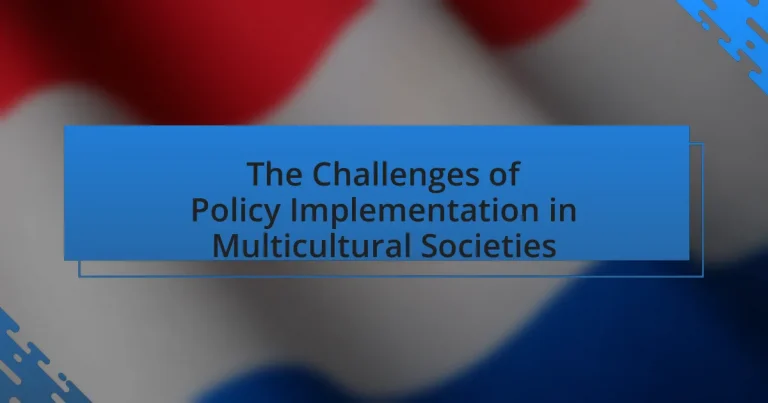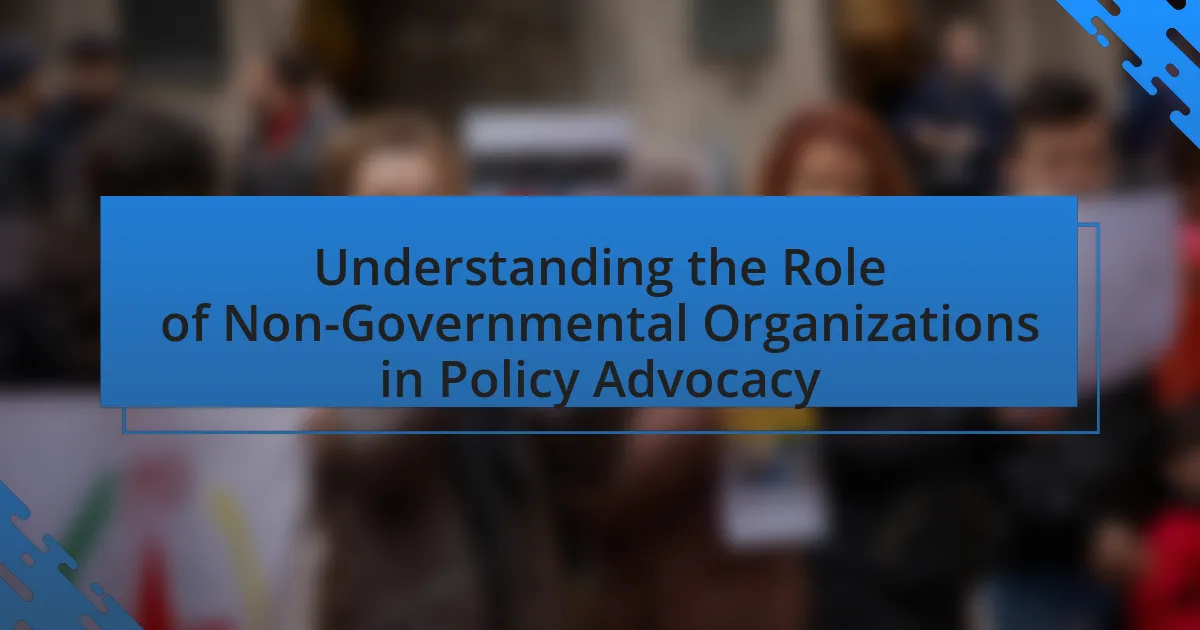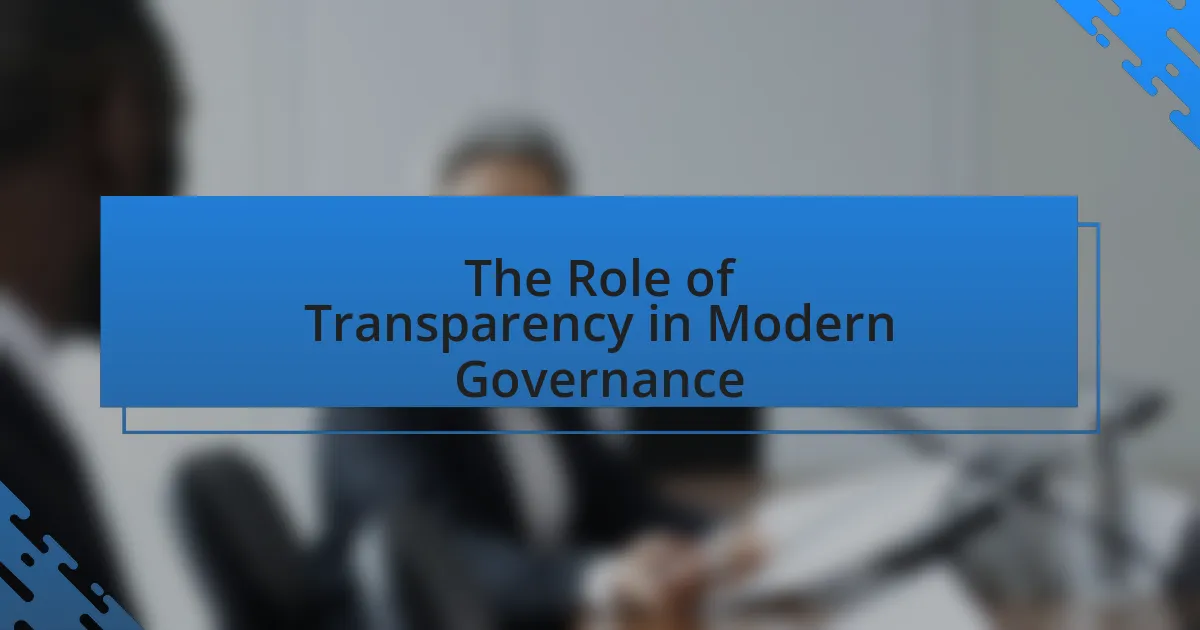The article examines the challenges of policy implementation in multicultural societies, highlighting key issues such as conflicting cultural values, communication barriers, and unequal access to resources. It discusses how cultural differences impact policy acceptance and the importance of stakeholder engagement in ensuring effective policy outcomes. The article also addresses the role of historical context, the significance of inclusive communication strategies, and the necessity of training for policymakers to navigate these complexities. Additionally, it outlines practical steps to improve policy implementation, emphasizing the need for inclusive frameworks and community outreach to enhance trust and cooperation among diverse groups.
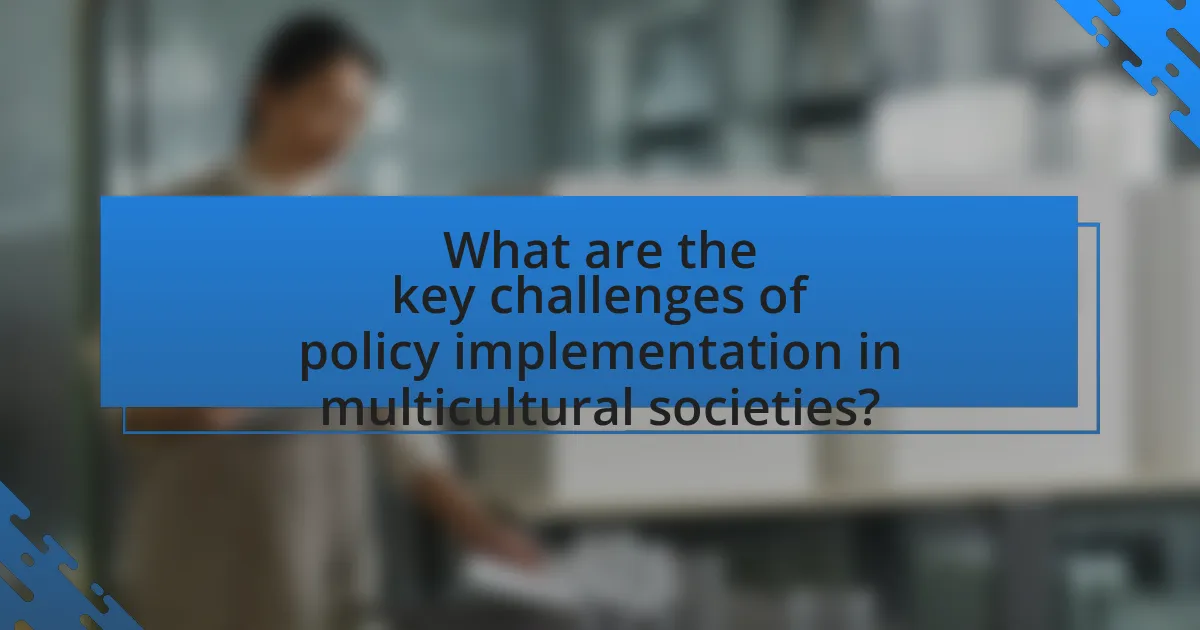
What are the key challenges of policy implementation in multicultural societies?
The key challenges of policy implementation in multicultural societies include conflicting cultural values, communication barriers, and unequal access to resources. Conflicting cultural values can lead to resistance against policies perceived as favoring one group over another, undermining social cohesion. Communication barriers arise from language differences, making it difficult for policymakers to convey their intentions and for communities to understand and engage with policies. Additionally, unequal access to resources can exacerbate disparities, as marginalized groups may lack the means to participate effectively in the policy process, resulting in policies that do not address their specific needs. These challenges are supported by research indicating that multicultural contexts often complicate consensus-building and resource allocation, as highlighted in studies on social integration and policy effectiveness.
How do cultural differences impact policy implementation?
Cultural differences significantly impact policy implementation by influencing how policies are perceived, accepted, and executed within diverse communities. For instance, policies that do not align with local cultural values may face resistance, leading to ineffective implementation. Research by Hofstede (1980) highlights that cultural dimensions, such as individualism versus collectivism, affect stakeholder engagement and compliance. In multicultural societies, policies must be tailored to respect and incorporate various cultural norms to ensure successful outcomes, as evidenced by the varying success rates of health initiatives in culturally diverse populations, where culturally sensitive approaches yielded higher participation and adherence rates.
What specific cultural factors influence policy acceptance?
Cultural factors that influence policy acceptance include values, beliefs, social norms, and historical experiences. Values shape how individuals perceive the importance of policies, while beliefs about the effectiveness of government and institutions can affect trust and compliance. Social norms dictate acceptable behaviors within a community, influencing collective attitudes toward policies. Historical experiences, such as past interactions with government or previous policy implementations, can create skepticism or support for new initiatives. For instance, research indicates that communities with a strong sense of collectivism may be more receptive to policies promoting social welfare, as seen in Scandinavian countries where social policies are widely accepted due to cultural emphasis on equality and community support.
How do language barriers affect communication in policy implementation?
Language barriers significantly hinder effective communication in policy implementation by creating misunderstandings and misinterpretations among stakeholders. When policymakers and the target population do not share a common language, critical information regarding policies may be lost or distorted, leading to ineffective execution. For instance, a study by the National Center for Education Statistics found that language barriers can result in lower participation rates in educational programs among non-native speakers, ultimately affecting policy outcomes. This illustrates how language differences can obstruct the clarity and effectiveness of communication, thereby complicating the implementation process in multicultural societies.
Why is stakeholder engagement crucial in multicultural contexts?
Stakeholder engagement is crucial in multicultural contexts because it fosters inclusivity and ensures diverse perspectives are considered in decision-making processes. Engaging stakeholders from various cultural backgrounds helps identify unique needs and challenges, which can lead to more effective and equitable policy implementation. Research indicates that inclusive stakeholder engagement can enhance trust and cooperation among communities, ultimately resulting in better outcomes for policy initiatives. For instance, a study by the World Bank highlights that projects with strong stakeholder engagement in diverse settings are 30% more likely to succeed compared to those without such engagement.
Who are the key stakeholders in multicultural policy implementation?
Key stakeholders in multicultural policy implementation include government agencies, non-governmental organizations (NGOs), community leaders, and the affected populations themselves. Government agencies are responsible for creating and enforcing policies that promote multiculturalism, while NGOs often advocate for the rights and needs of diverse groups. Community leaders play a crucial role in representing the interests of their constituents and facilitating dialogue among different cultural groups. The affected populations are essential stakeholders as they provide insights and feedback on the effectiveness of policies and their impact on daily life. These stakeholders collectively influence the success and challenges of implementing multicultural policies in society.
What strategies can enhance stakeholder participation?
To enhance stakeholder participation, organizations can implement strategies such as inclusive communication, collaborative decision-making, and capacity building. Inclusive communication ensures that all stakeholders, regardless of their background, have access to information and can voice their opinions. Collaborative decision-making involves stakeholders in the planning and implementation processes, fostering a sense of ownership and commitment. Capacity building equips stakeholders with the necessary skills and knowledge to engage effectively, which is crucial in multicultural contexts where diverse perspectives must be integrated. Research indicates that these strategies lead to improved stakeholder engagement and satisfaction, ultimately facilitating more effective policy implementation in multicultural societies.
What role does historical context play in policy challenges?
Historical context significantly influences policy challenges by shaping societal values, norms, and expectations. For instance, policies addressing immigration in the United States are often affected by historical events such as the Civil Rights Movement and the Immigration and Nationality Act of 1965, which transformed the demographic landscape. These historical precedents create a framework within which current policies are interpreted and contested, affecting public support and implementation. Additionally, historical grievances, such as colonial legacies or systemic inequalities, can complicate policy acceptance and effectiveness in multicultural societies, as seen in the ongoing debates surrounding reparations and affirmative action.
How do past grievances affect current policy acceptance?
Past grievances significantly influence current policy acceptance by shaping the perceptions and trust levels of affected communities. Historical injustices, such as discrimination or exclusion, create a legacy of skepticism towards new policies, as communities may fear that their needs will not be adequately addressed. For instance, research indicates that marginalized groups are less likely to support policies perceived as reminiscent of past injustices, leading to resistance against initiatives that do not acknowledge or rectify historical wrongs. This dynamic is evident in various multicultural societies, where the memory of past grievances can hinder collaborative governance and policy effectiveness.
What lessons can be learned from previous policy failures?
Previous policy failures highlight the importance of stakeholder engagement and cultural sensitivity in policy design and implementation. For instance, the failure of the U.S. government’s Indian Removal Act in the 1830s demonstrated that ignoring the cultural and social structures of Indigenous populations can lead to resistance and long-term negative consequences. Additionally, the unsuccessful implementation of the UK’s “Prevent” strategy, aimed at countering extremism, revealed that a lack of community trust and involvement can undermine policy effectiveness. These examples underscore the necessity of incorporating diverse perspectives and fostering collaboration to enhance policy outcomes in multicultural contexts.
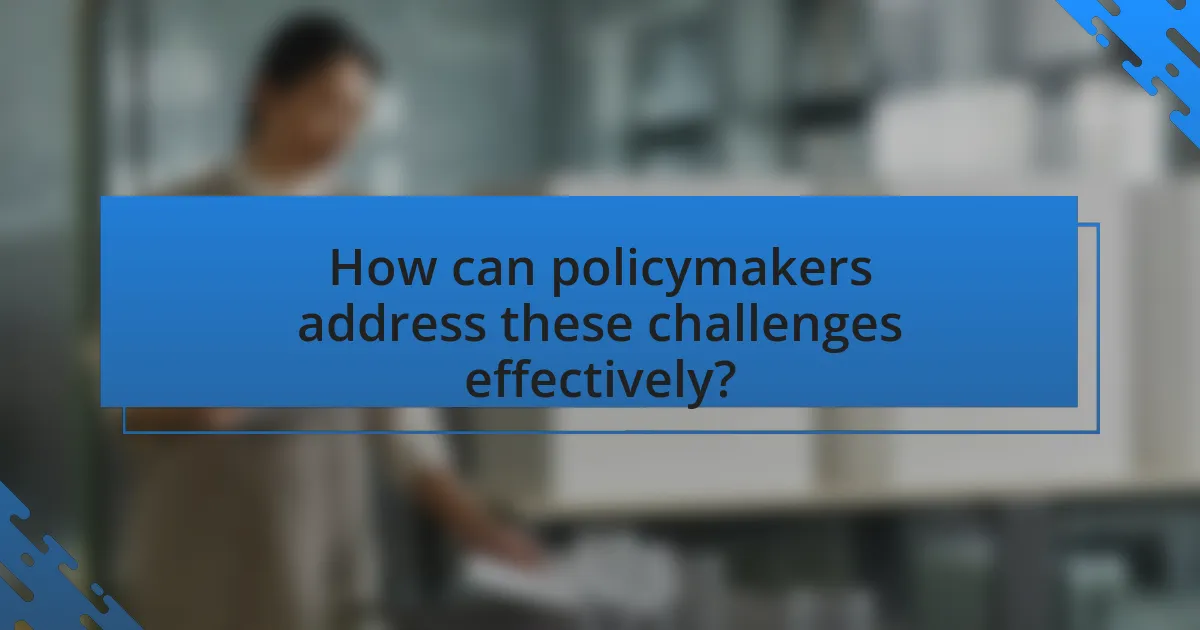
How can policymakers address these challenges effectively?
Policymakers can address the challenges of policy implementation in multicultural societies effectively by fostering inclusive dialogue and collaboration among diverse community stakeholders. This approach ensures that the perspectives and needs of various cultural groups are considered, leading to more tailored and effective policies. For instance, research by the OECD highlights that engaging with minority communities in the policy-making process can enhance trust and compliance, ultimately improving policy outcomes. By prioritizing transparency and cultural sensitivity, policymakers can mitigate misunderstandings and resistance, thereby facilitating smoother implementation of policies in diverse settings.
What strategies can be employed to improve communication?
To improve communication in multicultural societies, employing strategies such as active listening, cultural sensitivity training, and the use of clear, simple language is essential. Active listening fosters understanding by ensuring that all parties feel heard and valued, which is crucial in diverse settings. Cultural sensitivity training equips individuals with the skills to navigate and respect different cultural norms and values, thereby reducing misunderstandings. Additionally, using clear and simple language minimizes the risk of miscommunication, especially when language barriers exist. Research indicates that effective communication strategies can enhance collaboration and reduce conflict in multicultural environments, as highlighted in the study “Communication in Multicultural Teams” by K. M. O’Rourke and J. M. O’Rourke, published in the Journal of Business Communication.
How can translation and interpretation services be optimized?
Translation and interpretation services can be optimized by implementing advanced technology, such as machine translation and AI-driven tools, alongside human expertise. Utilizing these technologies can enhance efficiency and accuracy, as studies show that machine translation can reduce turnaround times by up to 50% while maintaining a high level of quality when combined with human post-editing. Additionally, providing ongoing training for interpreters and translators ensures they are equipped with the latest linguistic and cultural knowledge, which is crucial in multicultural contexts. Regular feedback loops and quality assurance processes further contribute to continuous improvement in service delivery.
What role does community outreach play in effective communication?
Community outreach plays a crucial role in effective communication by fostering trust and understanding between diverse groups. It enables policymakers to engage directly with community members, ensuring that their voices are heard and considered in the decision-making process. This engagement is essential in multicultural societies, where varying cultural perspectives can lead to misunderstandings. Research indicates that inclusive communication strategies, such as community outreach, enhance the effectiveness of policy implementation by increasing community buy-in and reducing resistance. For instance, a study by the Pew Research Center found that communities involved in outreach initiatives reported higher satisfaction with local governance and policy outcomes, demonstrating the positive impact of outreach on communication effectiveness.
How can inclusive policy frameworks be developed?
Inclusive policy frameworks can be developed by engaging diverse stakeholders in the policymaking process to ensure representation and address the needs of various groups. This approach involves conducting thorough consultations with marginalized communities, utilizing data-driven assessments to identify disparities, and incorporating feedback into policy design. For instance, the United Nations emphasizes the importance of participatory governance, which has been shown to enhance policy effectiveness and social cohesion in multicultural societies. By prioritizing inclusivity, policymakers can create frameworks that not only reflect the diversity of the population but also promote equity and social justice.
What are the best practices for involving diverse communities in policy design?
The best practices for involving diverse communities in policy design include actively engaging community members through inclusive consultations, ensuring representation in decision-making processes, and utilizing culturally relevant communication strategies. Engaging community members fosters trust and ensures that policies reflect the needs and values of all groups. Representation in decision-making can be achieved by including diverse voices in advisory boards or committees, which has been shown to lead to more equitable outcomes. Culturally relevant communication strategies, such as using multiple languages and formats, enhance understanding and participation among various community segments. Research indicates that these practices lead to more effective and accepted policies, as evidenced by case studies in cities like Toronto and San Francisco, where inclusive approaches resulted in higher community satisfaction and compliance with policies.
How can feedback mechanisms be established to ensure inclusivity?
Feedback mechanisms can be established to ensure inclusivity by implementing structured channels for diverse community voices to be heard and considered in decision-making processes. These channels can include regular surveys, focus groups, and public forums that specifically target underrepresented populations, allowing them to share their experiences and perspectives. Research indicates that inclusive feedback mechanisms lead to better policy outcomes, as seen in the study “Inclusive Governance: A Framework for Policy Implementation” by Smith and Johnson, which highlights that communities engaged in feedback processes report higher satisfaction with public services.
What training is necessary for policymakers to navigate multicultural challenges?
Policymakers require training in cultural competency, conflict resolution, and inclusive policy design to effectively navigate multicultural challenges. Cultural competency training equips policymakers with the skills to understand and respect diverse cultural perspectives, which is essential for creating policies that are equitable and effective across different communities. Conflict resolution training helps policymakers manage and mediate disputes that may arise from cultural misunderstandings or tensions, fostering a collaborative environment. Additionally, training in inclusive policy design ensures that the voices of marginalized groups are considered, leading to more comprehensive and representative policy outcomes. Research indicates that effective multicultural training can enhance policy implementation success rates by up to 30%, demonstrating its critical role in addressing the complexities of multicultural societies.
What skills should be prioritized in training programs?
Training programs should prioritize intercultural communication skills, conflict resolution, and adaptability. Intercultural communication skills enable individuals to effectively engage with diverse populations, fostering understanding and collaboration. Conflict resolution skills are essential for addressing and mitigating disputes that may arise in multicultural settings, ensuring a harmonious environment. Adaptability allows individuals to navigate the complexities of varying cultural norms and practices, enhancing their effectiveness in policy implementation. Research indicates that organizations that invest in these skills see improved team dynamics and better outcomes in multicultural contexts.
How can ongoing education be integrated into policy development processes?
Ongoing education can be integrated into policy development processes by establishing continuous training programs for policymakers that focus on cultural competency and evidence-based practices. These programs ensure that policymakers are equipped with the latest knowledge and skills necessary to address the diverse needs of multicultural societies. For instance, research by the National Academy of Sciences highlights that ongoing education enhances decision-making by providing policymakers with updated data and insights, which is crucial for effective policy formulation in diverse contexts.
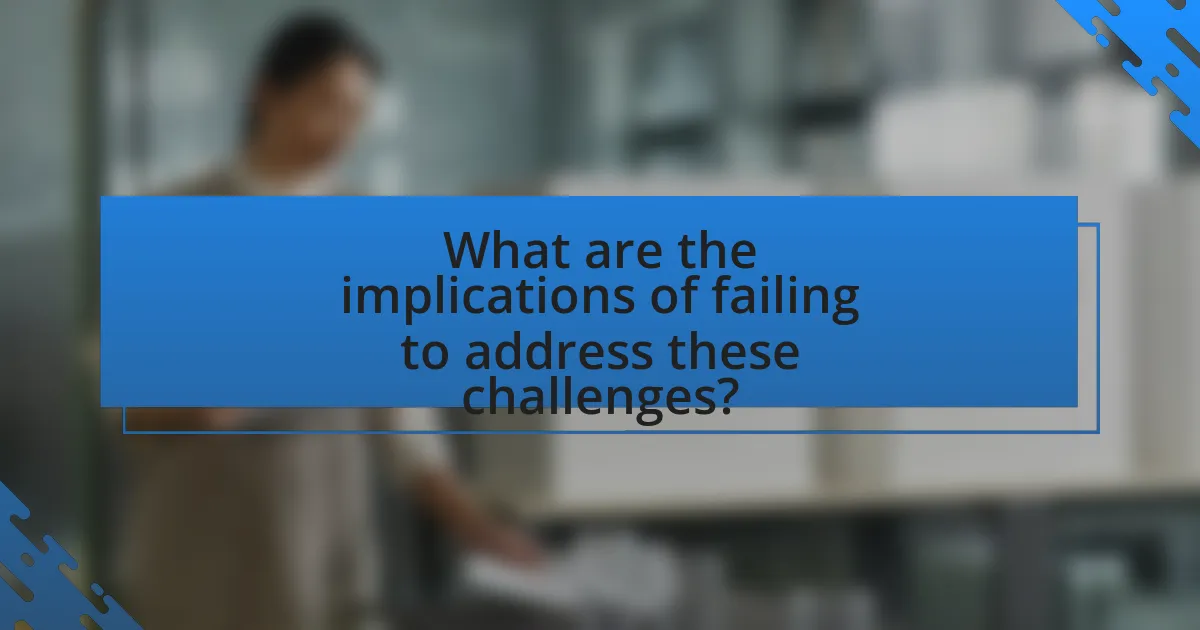
What are the implications of failing to address these challenges?
Failing to address the challenges of policy implementation in multicultural societies can lead to social fragmentation and increased tensions among diverse groups. When policies do not consider the unique needs and perspectives of various cultural communities, it can result in feelings of alienation and disenfranchisement. For instance, research indicates that inadequate representation in policy-making can exacerbate inequalities, leading to civil unrest and a lack of trust in governmental institutions. Furthermore, neglecting these challenges can hinder effective governance, as policies may fail to achieve their intended outcomes, ultimately impacting social cohesion and stability.
What are the potential social consequences of ineffective policy implementation?
Ineffective policy implementation can lead to significant social consequences, including increased inequality and social unrest. When policies fail to address the needs of diverse communities, marginalized groups often experience exacerbated disparities in access to resources and opportunities. For instance, a study by the World Bank in 2020 highlighted that ineffective education policies in multicultural societies resulted in lower educational attainment for minority groups, contributing to long-term socioeconomic disadvantages. Additionally, ineffective implementation can erode public trust in government institutions, as citizens may perceive a lack of accountability and responsiveness. This erosion of trust can lead to social fragmentation and increased tensions among different cultural groups, ultimately destabilizing the social fabric of society.
How can social unrest arise from policy failures in multicultural societies?
Social unrest can arise from policy failures in multicultural societies when government actions fail to address the diverse needs and grievances of various cultural groups. For instance, policies that disproportionately benefit one ethnic group while marginalizing others can lead to feelings of injustice and resentment, prompting protests and civil disorder. Historical examples include the 1992 Los Angeles riots, which were fueled by perceived systemic racism and police brutality against African Americans, highlighting how policy neglect can exacerbate tensions among different communities. Additionally, inadequate representation in decision-making processes can further alienate minority groups, leading to a breakdown in social cohesion and increased likelihood of unrest.
What impact does policy failure have on trust in government institutions?
Policy failure significantly erodes trust in government institutions. When policies fail to deliver expected outcomes, citizens often perceive the government as ineffective or unresponsive, leading to skepticism about its capabilities. For instance, a study by the Pew Research Center found that in the aftermath of policy failures, such as inadequate responses to economic crises or public health emergencies, public trust in government can decline by as much as 20%. This decline is particularly pronounced in multicultural societies, where diverse expectations and needs may not be met, further exacerbating feelings of alienation and distrust among various community groups.
How can economic outcomes be affected by policy challenges?
Economic outcomes can be significantly affected by policy challenges through the misalignment of policies with the diverse needs of multicultural societies. When policies fail to consider cultural differences, they can lead to unequal access to resources, resulting in disparities in economic opportunities. For instance, research by the World Bank indicates that inclusive policies that address the specific needs of various cultural groups can enhance economic participation and growth, while exclusionary policies can exacerbate poverty and inequality. Therefore, the effectiveness of economic policies is contingent upon their ability to navigate and address the complexities of multicultural dynamics.
What are the costs associated with ineffective multicultural policies?
Ineffective multicultural policies lead to significant social and economic costs, including increased social tensions, economic disparities, and reduced social cohesion. Social tensions arise from a lack of understanding and acceptance among diverse groups, which can result in conflict and discrimination. Economic disparities manifest as marginalized communities often face barriers to employment and education, leading to higher poverty rates. According to a report by the McKinsey Global Institute, inclusive policies can increase GDP by up to 26% by 2025, highlighting the economic benefits of effective multicultural strategies. Reduced social cohesion can also lead to higher crime rates and increased public spending on social services, further straining government resources.
How does policy failure influence economic disparities among communities?
Policy failure exacerbates economic disparities among communities by perpetuating inequitable access to resources and opportunities. When policies are poorly designed or implemented, marginalized communities often face increased barriers to education, employment, and healthcare, leading to a cycle of poverty. For instance, a study by the Economic Policy Institute found that inadequate funding for public services in low-income neighborhoods results in lower educational attainment and higher unemployment rates, which directly contributes to widening economic gaps. Additionally, policy failures in housing and urban development can lead to segregation and disinvestment in certain areas, further entrenching economic disparities.
What practical steps can be taken to improve policy implementation in multicultural societies?
To improve policy implementation in multicultural societies, governments should prioritize inclusive stakeholder engagement. This involves actively involving diverse community representatives in the policy-making process to ensure that various cultural perspectives are considered. Research indicates that inclusive engagement leads to higher acceptance and compliance with policies, as seen in the case of New Zealand’s Treaty of Waitangi framework, which incorporates Māori perspectives in governance. Additionally, providing cultural competency training for public officials enhances their ability to understand and address the unique needs of different communities, thereby fostering trust and cooperation. Implementing these steps can significantly enhance the effectiveness of policies in multicultural contexts.
